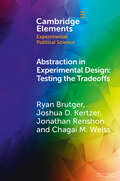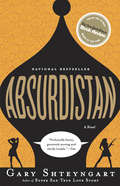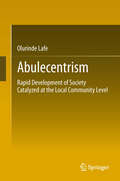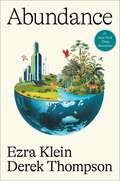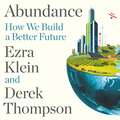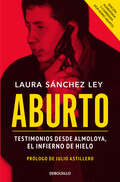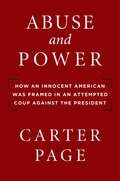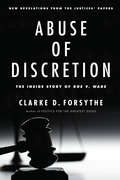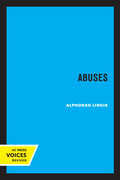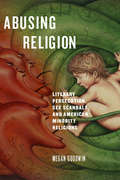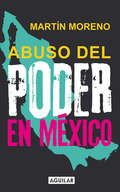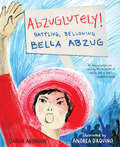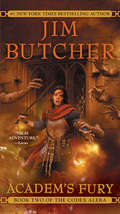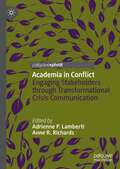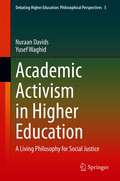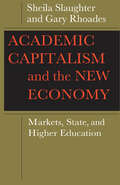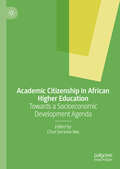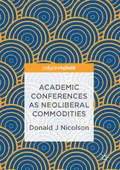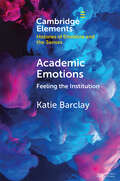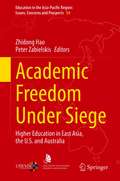- Table View
- List View
Abstimmungskampagnen: Politikvermittlung in der Referendumsdemokratie
by Klaus Kamps Heike ScholtenDie Anforderungen an die Politikvermittlung steigen. Um politisch komplexe Themen einer breiten politischen Öffentlichkeit verständlich zu machen, ist der wachsende Zugriff auf Emotionalisierung und Personalisierung zu beobachten. Nicht selten rückt das eigentliche Thema dabei in den Hintergrund. In Demokratien, in denen direktdemokratische Verfahren die politische Praxis bestimmen, verhält sich das anders. Hier werden die politischen Akteure quasi gezwungen das politische Sachgeschehen rechtzeitig und verständlich zu erklären und ihre Positionen zu begründen. ,,Politische Kampagnen in der Referendumsdemokratie" möchte die professionalisierten Kompetenzen in der politischen Kampagnenführung von Akteuren, die politische Kampagnen regelmäßig unter den Bedingungen einer ,,traditionellen" Referendumsdemokratie führen, für Dritte aufarbeiten.
Abstraction in Experimental Design: Testing the Tradeoffs (Elements in Experimental Political Science)
by Joshua D. Kertzer Jonathan Renshon Ryan Brutger Chagai M. WeissPolitical scientists designing experiments often face the question of how abstract or detailed their experimental stimuli should be. Typically, this question is framed in terms of tradeoffs relating to experimental control and generalizability: the more context introduced into studies, the less control, and the more difficulty generalizing the results. Yet, we have reason to question this tradeoff, and there is relatively little systematic evidence to rely on when calibrating the degree of abstraction in studies. We make two contributions. First, we provide a theoretical framework which identifies and considers the consequences of three dimensions of abstraction in experimental design: situational hypotheticality, actor identity, and contextual detail. Second, we field a range of survey experiments, varying these levels of abstraction. We find that situational hypotheticality does not substantively change experimental results, but increased contextual detail dampens treatment effects and the salience of actor identities moderates results in specific situations.
Absurdistan: A Novel
by Gary Shteyngart"Absurdistan is not just a hilarious novel, but a record of a particular peak in the history of human folly. No one is more capable of dealing with the transition from the hell of socialism to the hell of capitalism in Eastern Europe than Shteyngart, the great-great grandson of one Nikolai Gogol and the funniest foreigner alive." -Aleksandar Hemon. From the critically acclaimed, bestselling author of The Russian Debutante's Handbook comes the uproarious and poignant story of one very fat man and one very small country. Meet Misha Vainberg, aka Snack Daddy, a 325-pound disaster of a human being, son of the 1,238th-richest man in Russia, proud holder of a degree in multicultural studies from Accidental College, USA (don't even ask), and patriot of no country save the great City of New York. Poor Misha just wants to live in the South Bronx with his hot Latina girlfriend, but after his gangster father murders an Oklahoma businessman in Russia, all hopes of a U.S. visa are lost. Salvation lies in the tiny, oil-rich nation of Absurdistan, where a crooked consular officer will sell Misha a Belgian passport. But after a civil war breaks out between two competing ethnic groups and a local warlord installs hapless Misha as minister of multicultural affairs, our hero soon finds himself covered in oil, fighting for his life, falling in love, and trying to figure out if a normal life is still possible in the twenty-first century. With the enormous success of The Russian Debutante's Handbook, Gary Shteyngart established himself as a central figure in today's literary world--"one of the most talented and entertaining writers of his generation," according to The New York Observer. In Absurdistan, he delivers an even funnier and wiser literary performance. Misha Vainberg is a hero for the new century, a glimmer of humanity in a world of dashed hopes.
Abtreibungspolitik in Deutschland: Ein Überblick (essentials)
by Emma T. BuddeEmma T. Budde legt den Fokus auf die Darstellung und Erklärung der Regulierungsgeschichte von Abtreibungen in Deutschland von 1960 bis 2015. Sie kontrastiert die deutsche Entwicklung mit der Gesetzesentwicklung in Westeuropa. Hinsichtlich der Reformgeschwindigkeit und des Regulierungsniveaus ist Deutschland im internationalen Mittelfeld angesiedelt. Eine Besonderheit deutscher Abtreibungspolitik ist die Widersprüchlichkeit des aktuell geltenden Gesetzes, welches den Schwangerschaftsabbruch als gesetzeswidrig, aber gleichzeitig straffrei einstuft.
Abu Nidal: A Gun for Hire
by Patrick SealeBritish journalist Seale, distinguished as a Middle East specialist, details the Arab terrorist's career, the sources of his vast personal fortune, the motives behind his acts of terrorism and his ties to various Middle East and European governments.
Abulecentrism: Rapid Development of Society Catalyzed at the Local Community Level
by Olurinde LafeThe book describes a development concept called abulecentrism. The Yoruba word abule (pronounced: a-boo-lay) literarily means "the village". abulecentrism seeks to achieve rapid and sustainable development of a given society by the strategic execution of projects and the provision of critical services at the local community level. The village has always been the traditional unit of communal living in many societies around the world. The typical village is small, comprising close-knit social groups and individuals that number in the tens, or at most, low hundreds. In a village, people live close to one another, and derive strength in their communal methods of living, working and protecting their society. Furthermore, the management and governance of the community is simpler than in urban areas because the village requires smaller administrative systems. abulecentrism is built on the philosophy of using small, modular systems, such as a village, as building blocks for developing the greater society. The ultimate goal of abulecentrism is for the larger society to be significantly impacted by the dividends of the aggregated development attained within the different communities. Development projects will typically be executed by starting with a few local communities and progressing organically until all the communities that make up the larger society have been impacted.
Abundance
by Derek Thompson Ezra KleinFrom bestselling authors and journalistic titans Ezra Klein and Derek Thompson, Abundance is a once-in-a-generation, paradigm-shifting call to renew a politics of plenty, face up to the failures of liberal governance, and abandon the chosen scarcities that have deformed American life. <p> To trace the history of the twenty-first century so far is to trace a history of unaffordability and shortage. After years of refusing to build sufficient housing, America has a national housing crisis. After years of limiting immigration, we don’t have enough workers. Despite decades of being warned about the consequences of climate change, we haven’t built anything close to the clean-energy infrastructure we need. Ambitious public projects are finished late and over budget—if they are ever finished at all. The crisis that’s clicking into focus now has been building for decades—because we haven’t been building enough. <p> Abundance explains that our problems today are not the results of yesteryear’s villains. Rather, one generation’s solutions have become the next generation’s problems. Rules and regulations designed to solve the problems of the 1970s often prevent urban-density and green-energy projects that would help solve the problems of the 2020s. Laws meant to ensure that government considers the consequences of its actions have made it too difficult for government to act consequentially. In the last few decades, our capacity to see problems has sharpened while our ability to solve them has diminished. Progress requires facing up to the institutions in life that are not working as they need to. It means, for liberals, recognizing when the government is failing. It means, for conservatives, recognizing when the government is needed. <p> In a book exploring how we can move from a liberalism that not only protects and preserves but also builds, Klein and Thompson trace the political, economic, and cultural barriers to progress and propose a path toward a politics of abundance. At a time when movements of scarcity are gaining power in country after country, this is an answer that meets the challenges of the moment while grappling honestly with the fury so many rightfully feel. <b>New York Times Bestseller</b>
Abundance: How We Build a Better Future
by Derek Thompson Ezra KleinA FINANCIAL TIMES TOP PICK OF 2025The real threat to liberal democracy isn't just from autocrats - but from a lack of effective action by so-called progressives.We have the means to build an equitable world without hunger, fuelled by clean energy. Instead, we have a politics driven by scarcity, lives defined by unaffordability and public institutions that no longer deliver on big ideas. It's time for change.Bestselling authors Ezra Klein and Derek Thompson have spent decades analysing the political, economic and cultural forces that have led us here. In this once in a generation intervention, they unpick the barriers to progress and show how we can, and must, shift the political agenda to one that not only protects and preserves, but also builds. From healthcare to housing, infrastructure to innovation thy lay out a path to a futuredefined not by fear, but by abundance.
Aburto: Testimonios desde Almoloya, el infierno de hielo
by Laura Sánchez Ley"Déjenme decirles que me tengo que bañar, porque el olor a chivo expiatorio es muy fuerte." -Mario Aburto, carta desde Almoloya- Una sorprendente crónica periodística que cuenta la verdadera historia de Mario Aburto, el hombre acusado de haber asesinado a Luis Donaldo Colosio. "Huye, José, huye, José, ven, pacá, cuidao con la culebra..." La canción opaca los gritos desenfrenados de la multitud cuando se escuchan los disparos que marcan un antes y un después en la historia contemporánea de México. Mario Aburto es detenido en Tijuana, lo acusan de asesinar a Luis Donaldo Colosio mientras la incertidumbre se apodera del país. ¿Era el mismo hombre el que aprehendieron en Lomas Taurinas y el que presentaron en Almoloya? ¿Era Mario el asesino? Para sus familiares y amigos la interrogante es más profunda y aún les duele: ¿cuál esel verdadero Mario? ¿El que la PGR catalogó como un enfermo psiquiátrico o el hombre aniñado que conocieron antes? A contracorriente de los complots fantasiosos, este libro descubre a un Mario Aburto inédito, pero va mucho más allá, pues ofrece ángulos del caso Colosio que se han pasado por alto durante más de dos décadas. La historia se cuenta por medio de cartas y llamadas hechas desde la prisión, de expedientes judiciales y de entrevistas a personajes clave. Todavía hoy, varios han pedido anonimato por miedo a ser asesinados, como ocurrió con miembros del equipo de seguridad e investigadores. Al mismo tiempo, Aburto destaca por su retrato de la injusticia vista a través de los ojos de los habitantes de un barrio marginado donde quedó enterrado bajo un monumento el espejismo de un México que supuestamente iba a cambiar. Esta obra confirma que la desgarradura del 23 de marzo de 1994 no pierde vigencia, incluso para aquellos que defienden la versión del asesino solitario como incontestable, en la medida en que desenmascara la falsedad de un aparato estatal que persigue, tortura, asesina, y garantiza la impunidad de un "grupo de gentes corruptas que andan por ahí nada más chupando sangre como los vampiros", como le escribió alguna vez Mario Aburto a su padre.
Abuse and Power: How an Innocent American Was Framed in an Attempted Coup Against the President
by Carter PageThe chickens are coming home to roost for the corrupt officials, mainstream media, and Democratic operatives who ruined the life of an innocent American in an attempt to subvert our democracy. Carter Page, the man at the center of one of the worst scandals in our country&’s history, reveals how our nation&’s top law enforcement officials abused their power and framed an innocent American citizen in their effort to take down Donald Trump. Page&’s gripping account, which shows that the rot goes deeper than anyone realized, names the men and women who tried to pull off a coup and didn't care who got hurt.
Abuse of Discretion
by Clarke D. ForsytheBased on 20 years of research, including an examination of the papers of eight of the nine Justices who voted in Roe v. Wade and Doe v. Bolton, Abuse of Discretion is a critical review of the behind-the-scenes deliberations that went into the Supreme Court's abortion decisions and how the mistakes made by the Justices in 1971-1973 have led to the turmoil we see today in legislation, politics, and public health. The first half of the book looks at the mistakes made by the Justices, based on the case files, the oral arguments, and the Justices' papers. The second half of the book critically examines the unintended consequences of the abortion decisions in law, politics, and women's health.Why do the abortion decisions remain so controversial after almost 40 years, despite more than 50,000,000 abortions, numerous presidential elections, and a complete turnover in the Justices? Why did such a sweeping decision-with such important consequences for public health, producing such prolonged political turmoil-come from the Supreme Court in 1973? Answering those questions is the aim of this book. The controversy over the abortion decisions has hardly subsided, and the reasons why are to be found in the Justices' deliberations in 1971-1972 that resulted in the unprecedented decision they issued.Discuss Abuse of Discretion on Twitter using hashtag #AbuseOfDiscretion.
Abuses
by Alphonso LingisPart travelogue, part meditation, Abuses is a bold exploration of central themes in Continental philosophy by one of the most passionate and original thinkers in that tradition writing today. A gripping record of desires, obsessions, bodies, and spaces experienced in distant lands, Alphonso Lingis's book offers no less than a new approach to philosophy—aesthetic and sympathetic—which departs from the phenomenology of Levinas and Merleau-Ponty. "These were letters written to friends," Lingis writes, "from places I found myself for months at a time, about encounters that moved me and troubled me. . . . These writings also became no longer my letters. I found myself only trying to speak for others, others greeted only with passionate kisses of parting." Ranging from the elevated Inca citadel of Machu Picchu, to the living rooms of the Mexican elite, to the streets of Manila, Lingis recounts incidents of state-sponsored violence and the progressive incorporation of third-world peoples into the circuits of exchange of international capitalism. Recalling the work of such writers as Graham Greene, Kathy Acker, and Georges Bataille, Abuses contains impassioned accounts of silence, eros and identity, torture and war, the sublime, lust and joy, and human rituals surrounding carnival and death that occurred during his journeys to India, Bangladesh, Thailand, Bali, the Philippines, Antarctica, and Latin America. A deeply unsettling book by a philosopher of unusual imagination, Abuses will appeal to readers who, like its author, "may want the enigmas and want the discomfiture within oneself." This title is part of UC Press's Voices Revived program, which commemorates University of California Press's mission to seek out and cultivate the brightest minds and give them voice, reach, and impact. Drawing on a backlist dating to 1893, Voices Revived makes high-quality, peer-reviewed scholarship accessible once again using print-on-demand technology. This title was originally published in 1994.
Abusing Religion: Literary Persecution, Sex Scandals, and American Minority Religions
by Megan GoodwinSex abuse happens in all communities, but American minority religions often face disproportionate allegations of sexual abuse. Why, in a country that consistently fails to acknowledge—much less address—the sexual abuse of women and children, do American religious outsiders so often face allegations of sexual misconduct? Why does the American public presume to know “what’s really going on” in minority religious communities? Why are sex abuse allegations such an effective way to discredit people on America’s religious margins? What makes Americans so willing, so eager to identify religion as the cause of sex abuse? Abusing Religion argues that sex abuse in minority religious communities is an American problem, not (merely) a religious one.
Abuso del poder en México
by Martín MorenoAbuso del poder en México es una denuncia frontal a los actos vergonzantes de políticos y legisladores, líderes sindicales y empresarios televisivos, cómplices indolentes del deterioro de nuestro país en materia política, social y económica. Del autor de Demonios del sindicalismo en México, Martín Moreno. Abuso del poder en México aspira a despertar el ánimo de los ciudadanos para decir basta ante el delito, la injusticia y la desigualdad. ¿Cómo gobierna el presidente Calderón? ¿Por qué estalló la guerra entre los cárteles de la droga? ¿Cómo operan los priistas? ¿Por qué el DF está enfermo? ¿Qué hay detrás del conflicto entre el Gobierno y el Sindicato Mexicano de Electricistas? ¿Por qué nadie se atreve a enfrentar a Elba Esther Gordillo, al frente del Sindicato Nacional de Trabajadores de la Educación? ¿Cuál fue la ruta del dinero sustraído por Napoleón Gómez Urrutia, hoy impune en el extranjero? ¿Quién ordena la fabricación de culpables durante las investigaciones en los delitos de secuestro o intento de homicidio? Abuso del poder en México está sustentado por la investigación profunda y severa de Martín Moreno, quien retrata los sucesos más oscuros que marcaron el sexenio de Felipe Calderón, la ineptitud e indiferencia de funcionarios ante la tragedia de miles de mexicanos y la voracidad de políticos, narcos e inversionistas cuestionables que dictan sus propias leyes y marcan su territorio con violencia y sangre. El compromiso de Martín Moreno con la verdad, con la sociedad y con su país, lo llevan a denunciar los actos más deplorables de quienes ejercen el poder en México, sus prácticas de abuso, intolerancia, imparcialidad y soberbia.
Abzuglutely!: Battling, Bellowing Bella Abzug
by Sarah Aronson"As long as people are reading this book, Bella will be with us still." —Gloria SteinemMeet unique and outspoken Bella Abzug, the iconic Jewish politician and activist who fought for justice and women&’s rights, in this compelling picture book biography.Battling Bella Abzug was born bellowing! From her childhood in the Bronx to her years as a lawyer, activist, wife, mother, and congresswoman, Bella battled for justice and fairness for everyone. Inspired by her Jewish upbringing and wholehearted belief in tikkun olam—repairing the world—she spoke her truth everywhere she went. Even when it wasn&’t appreciated. Bella just kept on battling!Sarah Aronson and Andrea D&’Aquino spotlight this trailblazer who helped kickstart the modern women&’s movement—with humor and passion—always in one of her trademark wide-brimmed hats. An unstoppable and unforgettable leader who showed the world a vision for the future—that a woman&’s place was in the house—the House of Representatives! Abzuglutely!
Academ's Fury (Codex Alera #2)
by Jim ButcherIn Furies of Calderon, #1 New York Times bestselling author Jim Butcher introduced readers to a world where the forces of nature take physical form. But now, it is human nature that threatens to throw the realm into chaos. <P>For centuries, the people of Alera have harnessed the furies—elementals of earth, air, fire, water, wood, and metal—to protect their land from aggressors. But no fury can save them from the dangers they face within. A mysterious attack from across the sea has weakened the First Lord. Should he fall, a bloody civil war is inevitable. The responsibility of fending off assassination attempts and treachery within the First Lord’s circle of spies falls on Tavi, the one man with no fury to call.
Academia in Conflict: Engaging Stakeholders through Transformational Crisis Communication
by Anne R. Richards Adrienne P. LambertiThis book explores communication as a key influence on the trajectory of conflicts and crises in the specific context of academia. From the ideological responsibilities of academia to the profit-seeking motives of institutions, the authors explore challenges facing faculty across multiple disciplines. Critique of the higher education industry is more necessary than ever in the context of academic corporatization and marketization. Academia in Conflict reveals how institutional discourses can contribute to or mitigate conflict and crisis, offering communication practices that prioritize stakeholder experiences and needs. Enduring academic crises are addressed, including declines in public funding, mental health emergencies, and threats to job stability. Academia in Conflict provides crucial insights for navigating the challenges of higher education today.
Academic Activism in Higher Education: A Living Philosophy for Social Justice (Debating Higher Education: Philosophical Perspectives #5)
by Nuraan Davids Yusef WaghidThis book argues for renewed understandings of academic activism, understandings that conceive of the ideas, arguments and scholarship of the academe as embedded within the practices of what the academy does. It examines why and how a renewed notion of academic activism informs a philosophy of higher education specifically in relation to teaching and learning. The book focuses on the theories and practices of teaching and learning, in particular how such pedagogical actions are guided by social, political and cultural influences outside of the university as a higher education institution. The authors advocate for a living philosophy of higher education that is commensurate with real actions and imaginary fictions of what constitutes higher education and what remains in becoming for the discourse. With a focus on South African social justice education, the book imagines pathways for academic activism to manifest in revolutionised pedagogical actions or actions that bring into contestation what already exists with the possibility for the cultivation of renewal.
Academic Capitalism and the New Economy: Markets, State, and Higher Education
by Sheila Slaughter Gary RhoadesAs colleges and universities become more entrepreneurial in a post-industrial economy, they focus on knowledge less as a public good than as a commodity to be capitalized on in profit-oriented activities. In Academic Capitalism and the New Economy, higher education scholars Sheila Slaughter and Gary Rhoades detail the aggressive engagement of U.S. higher education institutions in the knowledge-based economy and analyze the efforts of colleges and universities to develop, market, and sell research products, educational services, and consumer goods in the private marketplace. Slaughter and Rhoades track changes in policy and practice, revealing new social networks and circuits of knowledge creation and dissemination, as well as new organizational structures and expanded managerial capacity to link higher education institutions and markets. They depict an ascendant academic capitalist knowledge/learning regime expressed in faculty work, departmental activity, and administrative behavior. Clarifying the regime's internal contradictions, they note the public subsidies embedded in new revenue streams and the shift in emphasis from serving student customers to leveraging resources from them.Defining the terms of academic capitalism in the new economy, this groundbreaking study offers essential insights into the trajectory of American higher education.
Academic Citizenship in African Higher Education: Towards a Socioeconomic Development Agenda
by Chux Gervase IwuThis book addresses national development and academic citizenship in higher education in Africa. For some, the concept of academic citizenship refers to the legitimate practice of academics working within Higher Education. To others, it suggests roles that are beyond the boundaries of academic institutions. There is a dearth of research on academic citizenship in relation to Africa. This edited volume contributes to a better understanding of the role of higher education in national development by presenting case studies and perspectives from a wide range of stakeholders, educators, and researchers in the African context.
Academic Citizenship, Identity, Knowledge, and Vulnerability (Debating Higher Education: Philosophical Perspectives #11)
by Nuraan DavidsThis book brings into contestation the idea of academic citizenship as a homogenous and inclusive space. It delves into who academics are and how they come to embody their academic citizenship, if at all. Even when academics hold similar professional standings, their citizenship and implied notions of participation, inclusion, recognition, and belonging are largely pre-determined by their personal identity markers, rather than what they do professionally. As such, it is hard to ignore not only the contested and vulnerable terrain of academic citizenship, but the necessity of unpacking the agonistic space of the university which both sustains and benefits from these contestations and vulnerabilities.The book is influenced by a postcolonial vantage point, interested in unblocking and opening spaces, thoughts, and voices not only of reimagined embodiments and expressions of academic citizenship but of hitherto silenced and discounted forms of knowledge and being. It draws on academics' stories at various universities located in South Africa, USA, UK, Hong Kong, and the Philippines. It steps into the unexplored constructions of how knowledge is used in the deployment of valuing some forms of academic citizenship, while devaluing others. The book argues that different kinds of knowledge are necessary for both the building and questioning of theory: the more expansive our immersion into knowledge, the greater the capacities and opportunities for unlearning and relearning.
Academic Collaborations in the Global Marketplace (Knowledge Studies in Higher Education #6)
by Anatoly V. OleksiyenkoThis book explains why conflict between the institutional and human agencies is an unavoidable outcome of competing local, national and global agendas at a major research university. It illustrates this by means of a case-study of Glonacal U, a university which belongs to the category of exceptional institutions that excel due to an established organizational culture of academic freedom, research excellence, shared governance, and intellectual leadership. The book shows how such a university may succumb to anxiety when neoliberal managers seek to exploit stakeholder doubts about university sufficiency, relevance, and performance in national and global markets and hierarchies of knowledge products and status goods. As top-down pressure for strategic choices in scientific partnerships increases at the world-class university, grassroots resistance to centralization increases also in order to remind the research university leaders that intellectual work and academic freedom are interdependent and central to building capacities for impactful global science. Productive global linkages are prerogative of academics who take full responsibility for success of project implementation and outcomes in scholarship and practice.
Academic Conferences as Neoliberal Commodities
by Donald J NicolsonThis book empirically examines academic conferences in the social sciences, and explores the purpose and value of people interested in the social sciences attending and presenting at national and international academic conferences. Using a highly original structure and style, the book considers the damaging impact of neoliberalism on conferences, and academia more widely, and explores the numerous barriers to conference attendance. It will be of interest to students and researchers who attend conferences in fields spanning the social sciences, as well as those interested in the effects of neoliberalism on academia.
Academic Emotions: Feeling the Institution (Elements in Histories of Emotions and the Senses)
by Katie BarclayThe University is an institution that disciplines the academic self. As such it produces both a particular emotional culture and, at times, the emotional suffering of those who find such disciplinary practices discomforting. Drawing on a rich array of writing about the modern academy by contemporary academics, this Element explores the emotional dynamics of the academy as a disciplining institution, the production of the academic self, and the role of emotion in negotiating power in the ivory tower. Using methodologies from the History of Emotion, it seeks to further our understanding of the relationship between the institution, emotion and the self.
Academic Freedom Under Siege: Higher Education in East Asia, the U.S. and Australia (Education in the Asia-Pacific Region: Issues, Concerns and Prospects #54)
by Zhidong Hao Peter ZabielskisThis book argues that academic freedom in higher education in East Asia, the U.S. and Australia is under stress. Academic freedom means freedom to teach, research, and serve in multiple political and social roles based on professional principles. It is closely linked to shared governance, in which academics participate in and influence decision making in core academic concerns such as choosing new faculty, faculty promotion, tenure decisions and the approval of new academic programs.In different countries and regions, the duress confronting academic freedom may come from different directions, and the ability of faculty to share power can vary greatly. In authoritarian mainland China, it is mostly political and ideological controls that greatly affect academic freedom, and shared governance is very much limited. In semi-democracies like Hong Kong and Macau and democracies like Taiwan, Japan, South Korea, the U.S. and Australia, corporatization and commercialization have had great impact on both academic freedom and shared governance. The result is that the roles professors play within academia are continually being diminished and the academic profession is struggling to maintain its ground. Similar developments are also occurring in Europe. These developments should cause great concern to educators, researchers and policymakers everywhere. The authors collected here present attempts to learn from current practice in order to move policy into directions that will help protect higher education as a common good. This book highlights the importance of academic freedom and provides insights into the ways it is being infringed both by commercialization and corporatization on the one hand and political repression on the other. It vividly illustrates detailed case studies and empirical data that make it a compelling read.- Professor Ruth Hayhoe, University of Toronto, Canada Academic freedom is as important today as at any time in the last century. The authors point out the challenges that academic freedom faces on a global scale. The import of the book is in its comparative perspective steeped in data and analysis. Thoughtful. Cogent. Compelling. - Professor William G. Tierney and Professor Wilbur-Kieffer, University of Southern California, United States

